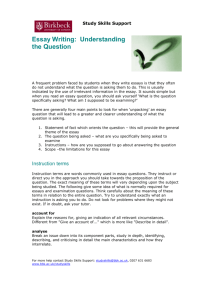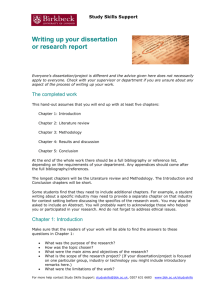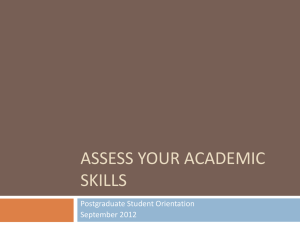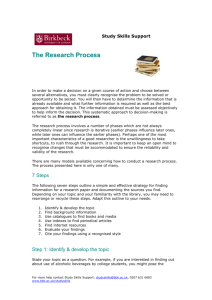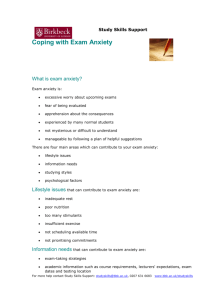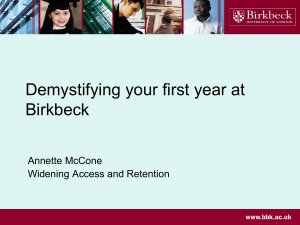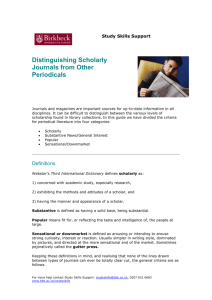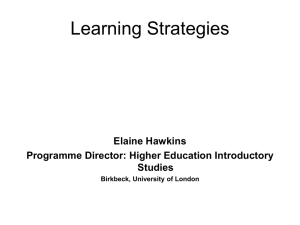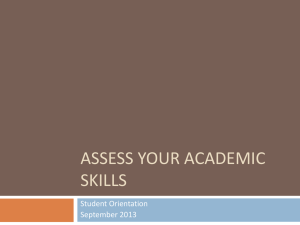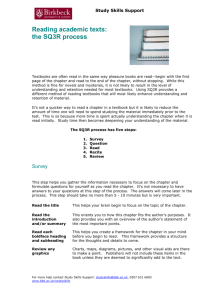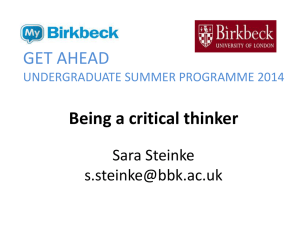Using the literature to write up your research
advertisement
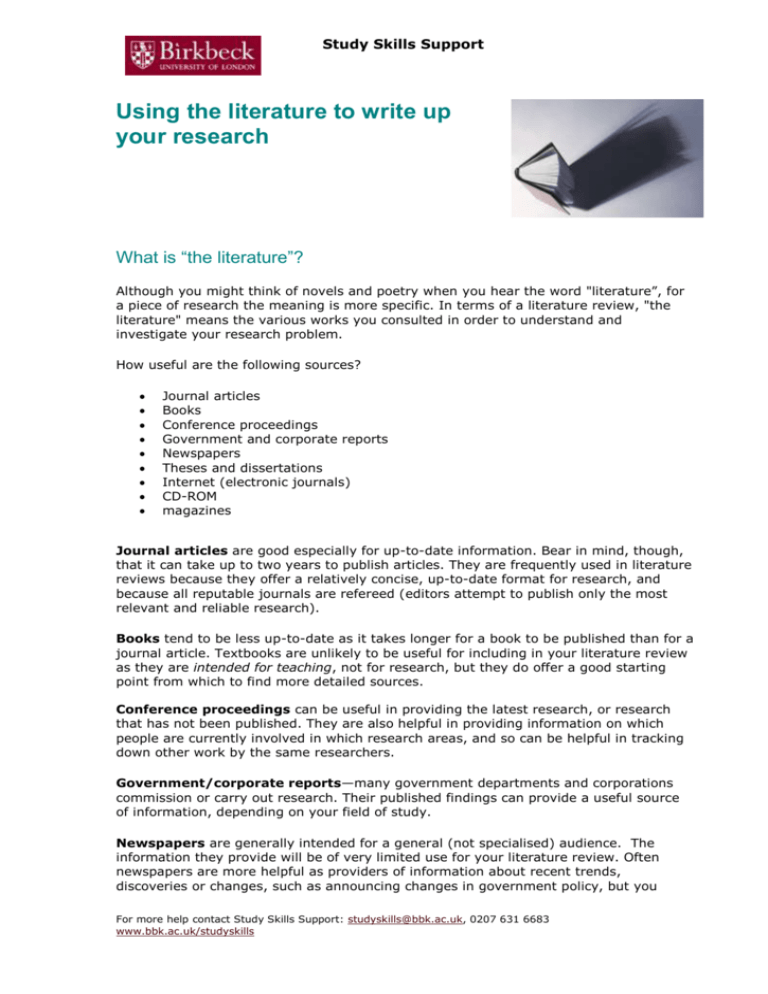
Study Skills Support Using the literature to write up your research What is “the literature”? Although you might think of novels and poetry when you hear the word "literature”, for a piece of research the meaning is more specific. In terms of a literature review, "the literature" means the various works you consulted in order to understand and investigate your research problem. How useful are the following sources? Journal articles Books Conference proceedings Government and corporate reports Newspapers Theses and dissertations Internet (electronic journals) CD-ROM magazines Journal articles are good especially for up-to-date information. Bear in mind, though, that it can take up to two years to publish articles. They are frequently used in literature reviews because they offer a relatively concise, up-to-date format for research, and because all reputable journals are refereed (editors attempt to publish only the most relevant and reliable research). Books tend to be less up-to-date as it takes longer for a book to be published than for a journal article. Textbooks are unlikely to be useful for including in your literature review as they are intended for teaching, not for research, but they do offer a good starting point from which to find more detailed sources. Conference proceedings can be useful in providing the latest research, or research that has not been published. They are also helpful in providing information on which people are currently involved in which research areas, and so can be helpful in tracking down other work by the same researchers. Government/corporate reports—many government departments and corporations commission or carry out research. Their published findings can provide a useful source of information, depending on your field of study. Newspapers are generally intended for a general (not specialised) audience. The information they provide will be of very limited use for your literature review. Often newspapers are more helpful as providers of information about recent trends, discoveries or changes, such as announcing changes in government policy, but you For more help contact Study Skills Support: studyskills@bbk.ac.uk, 0207 631 6683 www.bbk.ac.uk/studyskills should then search for more detailed information in other sources. Theses and dissertations can be useful sources of information. However there are disadvantages: 1) they can be difficult to obtain since they are not published, but are generally only available from the library shelf or through interlibrary loan; 2) the student who carried out the research may not be an experienced researcher and therefore you might have to treat their findings with more caution than published research. Internet—the fastest-growing source of information is on the Internet. It is impossible to characterise the information available but here are some hints about using electronic sources: 1) bear in mind that anyone can post information on the Internet so the quality may not be reliable; 2) the information you find may be intended for a general audience and so not be suitable for inclusion in your literature review (information for a general audience is usually less detailed); 3) more and more refereed electronic journals (ejournals) are appearing on the Internet; if they are refereed it means that there is an editorial board that evaluates the work before publishing it in their e-journal, so the quality should be more reliable depending on the reputation of the journal. CD-ROMS generally do not provide the kind of specialised, detailed information about academic research that you need for your own research since most are intended for a general audience. However, more and more bibliographies are being put onto CD-ROM for use in academic libraries, so they can be a very valuable tool in searching for the information you need. Magazines intended for a general audience (e.g. New Scientist or Psychology Today) are unlikely to be useful in providing the sort of information you need. Specialised magazines may be more useful (business magazines for management students, for examples) but usually magazines are not useful for your research except as a starting point by providing news or general information about new discoveries or policies that you can further research in more specialised sources. Why write a review of the literature? The literature review is a critical look at the existing research that is significant to the work that you are carrying out. Some people think that it is a summary. This is not true. Although you need to summarise relevant research, it is also vital that you evaluate the work, show the relationships between different work, and show how it relates to your work. In other words, you cannot simply give a concise description of, for example, an article. You need to select what parts of the research to discuss (e.g. the methodology), show how it relates to the other work (e.g. What other methodologies have been used? How are they similar? How are they different?) and show how it relates to your work (what is its relationship to your methodology?). Keep in mind that the literature review should provide the context for your research by looking at what work has already been done in your research area. It is not supposed to be just a summary of other people's work! Here are some of the questions your literature review should answer: 1. What do we already know in the immediate area concerned? 2. What are the characteristics of the key concepts or the main factors or variables? 3. What are the relationships between these key concepts, factors or variables? For more help contact Study Skills Support: studyskills@bbk.ac.uk, 0207 631 6683 www.bbk.ac.uk/studyskills 4. What are the existing theories? 5. Where are the inconsistencies or other shortcomings in our knowledge and understanding? 6. What views need to be (further) tested? 7. What evidence is lacking, inconclusive, contradictory or too limited? 8. Why study (further) the research problem? 9. What contribution can the present study be expected to make? 10. What research designs or methods seem unsatisfactory? Writing your own literature review It's easy to write a bad literature review and difficult to write a good one. The main mistake that a lot of people make is to write a literature review that looks like this: LITERATURE REVIEW Until recently many researchers have shown interest in the field of coastal erosion and the resulting beach profiles. They have carried out numerous laboratory experiments and field observations to illuminate the darkness of this field. Their findings and suggestions are reviewed here. JACHOWSKI (1964) developed a model investigation conducted on the interlocking precast concrete block seawall. After a result of a survey of damages caused by the severe storm along the coast of USA, a new and especially shaped concrete block was developed for use in shore protection. This block was designed to be used in a revetment type seawall that would be both durable and economical as well as reduce wave run-up and overtopping, and scour at its base or toe. It was proved that effective shore protection could be designed utilising these units. HOM-MA and HORIKAWA (1964) studied wave forces acting on the seawall which was located inside the surf zone. On the basis of the experimental results conducted to measure wave forces against a vertical wall, the authors proposed an empirical formula of wave pressure distribution on a seawall. The computed results obtained by using the above formula were compared well with the field data of wave pressure on a vertical wall. SELEZOV and ZHELEZNYAK (1965) conducted experiments on scour of sea bottom in front of harbour seawalls, basing on the theoretical investigation of solitary wave interaction with a vertical wall using a Boussinesque type equation. It showed that the numerical results were in reasonable agreement with laboratory experimental data. …and so on. Have another look at the questions a literature review should answer. See if you can answer the following questions about the literature review above: For more help contact Study Skills Support: studyskills@bbk.ac.uk, 0207 631 6683 www.bbk.ac.uk/studyskills Which of the questions does this literature review answer? Which of them doesn’t it answer? What system has the writer used to organise the literature review? Is it a good literature review? Why or why not? Which of the questions does this literature review answer? This literature offers a summary of previous research, so it does answer the first question. It simply tells the reader what was discovered in previous research. Which of them doesn't it answer? This literature review doesn't answer any of the questions from 2 to 10. It doesn't evaluate the research it summarises, nor does it show the relationships between the different theories, views and approaches it describes. Which method has the writer used to organise the literature review? The writer has organised this literature review around the researchers and has presented it chronologically (arranging the work by when it was published). Notice that by organising it around the researchers (the summaries are listed after the names of the people who did the research) and not around the research (around key concepts) the writer emphasises the people and not their work. Is it a good literature review? Why? We don't believe that it is a good literature review. It only gives a summary of previous research; it does not use the literature to explain more about the writer's own research problem. Also, it is not critical: after we read it we still do not know which theories or findings are important, which are inconclusive and what the shortcomings are. The main problem with this literature review is that it does not show how previous research relates to the writer's own research problem, or the relationship between different research already carried out. Given the organisation the writer has used, this literature review could not be effective because there is little scope for showing relationships, drawing comparisons or making evaluations. How can I write a good literature review? Remember the purpose: it should answer the questions we looked at above. Look at how published writers review the literature. You'll see that you should use the literature to explain your research; after all, you are not writing a literature review just to tell your reader what other researchers have done. You aim should be to show why your research needs to be carried out, how you came to choose certain methodologies or theories to work with and how your work adds to the research already carried out. Read with a purpose: you need to summarise the work you read but you must also decide which ideas or information are important to your research (so you can emphasise them), and which are less important and can be covered briefly or left out of your review. You should also look for the major concepts, conclusions, theories and arguments that underlie the work, and look for similarities and differences with closely For more help contact Study Skills Support: studyskills@bbk.ac.uk, 0207 631 6683 www.bbk.ac.uk/studyskills related work. This is difficult when you first start reading, but should become easier the more you read in your area. Write with a purpose: your aim should be to evaluate and show relationships between the work already done (Is Researcher Y's theory more convincing than Researcher X's? Did Researcher X build on the work of Researcher Y?) and between this work and your own. In order to do this effectively you need to carefully plan how you are going to organise your work. A lot of people like to organise their work chronologically (using time as their organising system). Unless developments over time are crucial to explain the context of your research problem, using a chronological system will not be an effective way to organise your work. Some people choose to organise their work alphabetically by author name: this system will not allow you to show the relationships between the work of different researchers, and your work, and should be avoided. When you read for your literature review, you are actually doing two things at the same time (which makes things more difficult for you): 1. You are trying to define your research problem: finding a gap, asking a question, continuing previous research, counter-claiming. 2. You are trying to read sources relevant to your research problem. Naturally, until you have defined your problem, you will find that there are hundreds of sources that seem relevant. However, you cannot define your problem until you read around your research area. This seems a vicious circle, but what should happen is that as you read you define your problem, and as you define your problem you will more easily be able to decide what to read and what to ignore. Some traps to avoid Trying to read everything? As you might already have discovered, if you try to be comprehensive you will never be able to finish the reading. The idea of the literature review is not to provide a summary of all the published work that relates to your research, but a survey of the most relevant and significant work. Reading but not writing? It's easier to read than to write: given the choice, most of us would rather sit down with a cup of coffee and read another article instead of putting ourselves in front of the computer to write about what we have already read! Writing takes much more effort, doesn't it? However, writing can help you to understand and find relationships between the work you've read, so don't put writing off until you've "finished" reading. You will probably still be doing some reading all the way through to the end of your research project. Also, don't think of what you first write as being the final or near-final version. Writing is a way of thinking, so allow yourself to write as many drafts as you need, changing your ideas and information as you learn more about the context of your research problem. Not keeping bibliographic information? The moment will come when you have to write your references page . . . and then you realise you have forgotten to keep the information you need, and that you never got around to putting references into your work. The only solution is to spend a lot of time in the library or visiting the e-library again tracking down all those sources that you read, and going through your writing to find which information came from which source. To avoid this unnecessary nightmare, always keep track of the sources you refer to. Always put references into your writing. For more help contact Study Skills Support: studyskills@bbk.ac.uk, 0207 631 6683 www.bbk.ac.uk/studyskills Links OWL online writing lab sample literature review http://owl.english.purdue.edu/owl/search.php – Purdue University’s Online Writing Lab Community studies literature review http://www.infed.org/community/bcomstd.htm Doing a Literature Review: Releasing the Social Science Research Imagination http://www.amazon.co.uk/Doing-Literature-Review-ReleasingImagination/dp/0761959750 For more help contact Study Skills Support: studyskills@bbk.ac.uk, 0207 631 6683 www.bbk.ac.uk/studyskills
